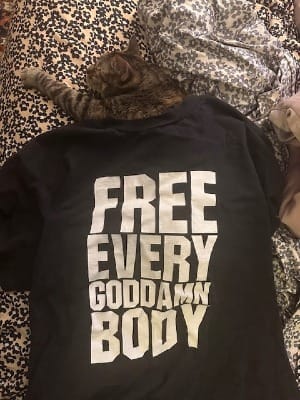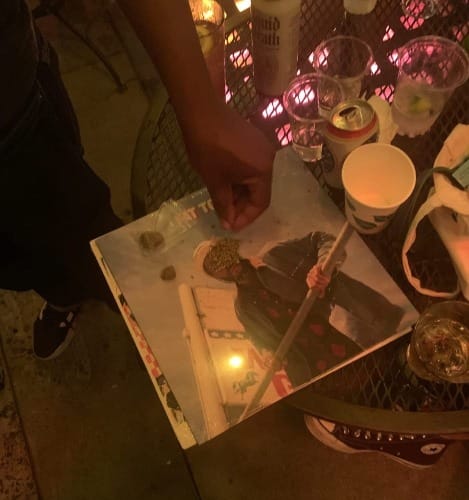*extreme Crypt Keeper voice* “billy woods”

“Now watch me make a movie like Albert Hitchcock.”
— Pitbull
*extreme Crypt Keeper voice* “billy woods”
Pitchfork had billy woods on its radar as early as 2013, only ten years into the something-years-old rapper’s recording career. It only took another five years before woods’ name carried enough freight to overrule any house style and the man’s preferred lower cases were applied. It’d be cute to read too much into The Most Trusted Voice in Music recognizing a kindred spirit, but that’d flatter a lie while simultaneously condescending to an artist whose relationship with trust—in lovers, peers, ideology, the authorial voice, or any authority who might claim to deserve it—is uneasy at best.
Without denying any obvious evolution otherwise, and while celebrating the man’s obvious upwards trajectory, the journey from woods matter-of-factly intoning “They said it's easy money, But I just can't trust it. She said, ‘I love you, honey,’ But I just can't trust it. He said those his boys, not to worry. Just can't trust it. They said come through, everything lovely, Just can't…” (on 2013’s “Tinseltown”) and him sing-song sinisterly “Don’t trust anyone” times two (on this year’s “Waterproof Mascara”) isn’t a journey so much as an inhabiting of an intractable worldview. The “don’t trust anyone” line is spoken from the perspective of woods’ mom. As anyone who’s had a mother can tell you, that detail doesn’t really undercut the thesis. Whatever the cause (nature, nurture, the Central Intelligence Agency being as much a character in the woods cinematic universe as NYC was in Sex In The City), the end result is the same.
Music criticism (in general, myself included, not just picking on my frenemies at Freedom Tower) has to demand its trustworthiness to command it, and what it currently commands is somewhere between jack and shit. billy woods, on the other hand, commands trust, not by claiming ownership of the truth so much as ruling out all other narrators as unreliable. A child of the Cold War, woods’ approach is the Russian/Reaganesque “доверяй, но проверяй” (trust but verify), with the caveat that nothing but that which can be held in one’s hand is verifiable; all else is either big butt or smile. So, by process of eliminating everyone from Doctor Dre to Aughts-rap backbiters to Frantz Fanon, the most trusted voice in music is billy woods. That is, woods and Elucid, and his Backwoodz coterie, MF Doom, and maybe a couple other universal sceptics like Ras Kass (as long as the listener is discerning enough to take the cats, which woods references with wry approval, seriously but not necessarily literally… woods has lived through too many real-time conspiracies to worry about the ins and outs of any moon landing).
These questions of trust matter, or they did. My wife and I have been watching the African News Channel lately. As muslims, reasonably-leftists, and regular consumers of both the Young Turks and Dougie Corrado, we enjoy the ASMR reporters with AI au naturale hairdos, recounting Odyssey-ian tales about Ibrahim Traoré methodically reducing his colonialist interlocutors into stunned silence. Considering that the villains in these clips are invariably French or English, with the occasional American general thrown in for taste, what’s not to love? Any spokesperson from BRIC could claim that their streets are paved with cheese and that “Commandant” is just a childhood nickname, and they’d still be closer to honest about the Sahel than any Western or IDF shill, RT reporter, Bari Weiss-type (assuming anyone in her crew has heard of any Africa not explicitly mentioned in the first two Testaments), or your average scriptwriter for Black Panther. Because all things being equal, things aren’t equal. When the U.S.A. or France test their nukes out on their own island resorts, we can act like all propaganda is the same. America had the Minutemen and Paul Revere, so I figure every new regime gets a window where they can have a bit of myth making fun. That said, I’d like to think that truth shouldn’t be dependent on being slightly less a lie than the fibs foisted upon us by the G7. In all this, woods’ mini-epics, reported from all fronts, matter. As does his Jacobin interview, where he comes off as the first moral realpolitiker.
As for the past tense part, how trust used to matter, I’m not sure what trusting billy woods will get us. Not having been alive during the first Holocaust, I’ve been on the planet for a fair number of systemic atrocities which proved “never again” to be a heavily astrix’ed statement. For the most part, those atrocities (see: Afghanistan, Sudan) never got the popular response they deserved. The first example, because Bush didn’t raise taxes to do war crimes. The latter, because Blackness. With the mass murders committed in both Afghanistan and Sudan suffering, PR-wise, for not having Jews involved on either side. The Israeli ethnic cleansing of Palestine is the second I’ve seen where there has been plenty of pushback, hundreds of thousands in the streets, reams of art (including multiple references in Golliwog) in opposition, with, as a sicking memification of Iraq, literally nothing moving the needle for either the perpetuators or the perpetuation’s munitionists. I recently saw Soundtrack to a Coup d’Etat, the documentary about how jazz musicians were unwittingly used as soft power by the United States during the Cold War, culminating with the CIA positioning Louis Armstrong to be in-country Congo when Patrice Lumumba was kidnapped. In the film, it’s understood by the State that art might mean something, so it must therefore be either crushed or used. With the exceptions of Kid Rock and Radiohead, few contemporary artists would allow themselves to be so used. Also, no one at the State Department is asking. Turns out that the CIA could have couped whoever they liked without ever once checking to see if Jackson Pollack was on board.
I may have reached an unpleasant (and, sure, privileged) point of nihilism where I don’t know what art, trust, or truth might be good for. Their objective/inherent good might be only derived from them just being the thing one does, like breathing or hardcore. Could be worse, but could be better. There’s a realpolitik saying, repeated to Kenyan political reformer John Githongo, during a 2003 transition of power in that country, about how the oppressed, if they gain power, can strive perilously for an egalitarian society, or they can go for theirs. The saying is, “it’s our turn to eat.” In “STAR87,” billy woods interpolates that saying into “Why when it's my turn to eat, it's always ashes in my mouth?” Great question, billy woods.
Anyway, it’s nice that Condé Nast is spelling his name right.
Quitters, Inc.
2012’s History Will Absolve Me has been cited by woods as the album that garnered enough attention to warrant a then thirty-something rapper not throwing in the towel. Who knows if he’d have quit if the album had tanked, and who knows if he’d stuck around if everything after had been mere plateau. Maybe not even worth wondering about. I’m not looking to project neurosis on the man, nor speculative fictions upon the man’s timeline. Just saying that woods has devoted a fair amount of verbiage to the topic of delusional strivers. Sometimes he does so with bottomless empathy, sometimes he goes the other way.
So, if History Will Absolve Me hadn’t blown some minds—hadn’t led to Blockhead big upping woods on his (now sadly/understandably defunct) blog and then reaching out to collaborate on Dour Candy, if the album hadn’t done anything at all—maybe the rapper would have kept keeping on regardless, either for the sake of riddling or out of pure spite. In a Passion Of The Weiss interview with Paul Thompson, woods says (about the album’s cover and title), “Castro said ‘history will absolve me’ and, well…it might not [laughs]... In a more literal sense, it was ‘yeah, okay, they can front on this record, but somebody’s going to hear what I’m doing here, and someone will know I was doing some things.’ The other side of it is that history didn’t absolve Castro, and I figure it probably won’t absolve me either.” Even when couched in (potentially) self-lacerating irony, being able to see oneself as not so different from the notable revolutionaries of the 20th Century implies a sense of self healthy enough to at least demo another album or two.
On the other hand, billy woods is nothing if not clear eyed. It’s unlikely he’d continue hiding his face—from a world that wasn’t trying to see it in the first place—indefinitely.
Thankfully, we live in the best of all possible timelines. Or at least we live in the one we live in. If, within billy woods’ lyrical narratives (autobiographical or nah) “woods against the world” skews pyrrhic, the rapper’s stylistic war—between his own wild one and the world’s house—has been one of attrition. billy woods’ ego tripping (if that term might be applied to designating oneself as a Robert Mugabe type figure within the East Coast independent rap scene of the 2010s) has proven to be correct. Without giving the counter-revolutionaries in music criticism any credit beyond the ability to read the room (and acknowledging that “reading the room” was the chief editorial mandate of the time), billy woods’ name being stylized correctly in Pitchfork’s positive reviews of Paraffin and Hiding Places (2018 and 2019 respectively) is useful as another demarcation in the ascension (along with creative partner, Elucid) of woods. History is currently loving up on the rapper to a degree that Castro’s ghost is probably considering using a billy woods quote as the title for the next album he drops in atheist heaven (i.e. Hell*).
If it seems as though I’m taking pains to include woods’ partner in my praise, that’s because parasociability isn’t just for the kids; as someone with a fair number of friends who got famous, I have a great deal of appreciation for how the friendship of Armand Hammer is two artists who, when not operating as a unit, seem to be successfully taking turns in the spotlight. Last year, Elucid’s REVELATOR was correctly lauded for how it almost off-handedly condensed a half century of avant-accessibility (from musique concréte to Mingus to Yellow Magic Orchestra to Wu-Tang to Dälek) into forty-five minutes of propulsive sound slabs that would have maintained its cool even if its composer wasn’t wearing skyline-and-trees reflecting shades on the (Alexander Richter shot) LP cover. Prior to that was Armand Hammer’s We Buy Diabetic Strips, which followed woods’ Maps, which followed Elucid’s I Told Bessie, and so on… the result being one of those very rare songwriting partnerships where both the wham and the bam are George Michael. Considering the concentric talent around the partnership (with SKECH185, Blockhead, PremRock & Curly Castro, Steel Tipped Dove, Fatboi Sharif, DJ Harem, and ØKSE being my faves, but you probably have your own) a better analogy—with no disrespect to “Careless Whisper”—would be Becker & Fagen. If that comparison is inexact (The Nightfly is a hell of a record, but it’s no Today, I Wrote Nothing), let me get even more loose and make Willie Green the Michael McDonald. The engineer/mixer/producer/composer’s role is obviously far greater than just adding the high and weird notes, but I hate to diverge from the riff and it feels disrespectful to compare Willie Green to anyone not famous.
*jk
Ghost Detainees
Golliwog is an album inspired by horror films. I know this because, in both promotional material and interviews, woods has said so. Would I know otherwise? I don’t know. I don’t watch horror movies (because they’re scary) so any signifiers post-The Shining are lost on me. I do love Cat’s Eye, which is another stated inspiration, but it’s not like woods is making jokes about James Woods (probably because it would be confusing). Yeah, there’s certainly more direct allusions to the supernatural on Golliwog than maybe usual but, for someone like myself, who came up immersed in Nick Cave lyrics, succubus/succubi-as-metaphor doesn’t necessarily imply a theme.
Most importantly, in a song like “STAR87,” if you didn’t tell me that the ghosts nagging at the protagonist’s conscience were literally ghosts I’d assume they were like any number of ill-wishers in the woods discography; (un)dead to him, regardless of their actual state of existence. None of this implies that the rapper doesn’t successfully convey his theme. woods has already stated that the album is more anthology horror than concept album, and anthology horror is an umbrella which covers physiological horror, straight up thrillers, Amazing Stories-type morality tales, and everything in between. So, rather than being pedantic, I’m just saying that vampirism (in one form or another) is a topic which woods is well versed in and the cover art of Hiding Places is one Mystery Machine and meddling-kids polycule short of being an episode of Scooby-Doo. I mean, really, just like Nick Cave (though considerably less prone to equivocating about Zionism), when it comes to a billy woods album, I’d be hard pressed to think of one that isn’t 50% ghost stories. Heck, Elucid has been saying “so goth I was born black” since 2013. In woods’ cosmology, to paraphrase Peter Murphy, the victims been bled and someone is always on the rack.
Anyway, if UK deejays like The Caretaker can add some crackle to the Carnival of Souls soundtrack and say it’s about the love, laughter, and ghost of the English empire (as opposed to, fun as it is, its actual theme: the desire for meaning amongst a generation of burned-out-on-Brit-Pop music critics), billy woods can make horrorcore without having to sound identical to Gravediggaz. Which is not to say that “Cold Sweat,” the track where woods and (Atmosphere's) Ant construct the platonic middleground between Everywhere at the end of time and “1-800 Suicide,” isn’t hellaciously great. Indeed, as a whole, Golliwog is a frightfest on its own merits.
Ye olde crackling piano is a recurring motif throughout Golliwog; Erik Satie as the English nanny being driven nuts by screws (both chopped and turned). That the spooky twins hiding in the wardrobe are played by the Dulles Brothers doesn’t diminish the CinemaScope atmospherics. Even when the horror depicted is prosaic—the protagonist of “BLK XMAS” joining in the neighborhood scavenging of their neighbor’s misfortune—the sense of what’s predetermined makes every character’s disappointment (in themselves or the world) as tightly, irrevocably plotted as a Alfred Hitchcock Presents. The same goes for time travelling and dreaming. As with Dana in Octavia Butler’s time travel novel, Kindred, you can subscribe to “amputation how you survive” or Despot’s ecclesiastical bravado (“clip them wings, change the way time flies for you,” “they ain’t get far without an arm and a leg”), either way you’re going to lose an arm at best.
And, with horror’s tropes always being shorthand for “the universe doesn’t care about your plans,” there's no point in shouting “don’t go in there!” because, babe, you’re already in. In fact, there is no out there. If woods doesn’t include Nope among his cinematic touchstones, it’s maybe because he’s not a fan, maybe because it just didn’t have any samples that fit, or maybe it’s because Jordan Peele’s love of the American Western keeps the director on the wrong side of the veil, in terms of believing the forces above which suck us up and slowly devour us might be overcome with a cowboy can-do attitude and a bit of string. When the mother in “Waterproof Mascara” says, “The king's dead and your uncles are not our friends / How many times I gotta tell you kids? It's us in this room, that's it,” she may be being paranoid, but she’s not entirely wrong.
There’s grim humor throughout Golliwog (though it helps if you understand sports references). woods has the good taste to keep the actual punchlines more to the relationship drama than the geopolitical (though, as someone who was a down bad social striver in his twenties, the “if it’s a tight squeeze, you the one thumbing” line was NOT FUNNY) but, regardless of context, “if you never came back from the dead, you can’t tell me shit” and “surface to air camouflage in the truck bed, on God, best believe those crackers won’t make it to Mars” (both from “Corinthians”) could be written from Richard Pryor and the Last Poets respectively. Mind you, woods protestions of being hilarious aside, there’s nothing here that’s lol, let alone lmfao. It’s all more in the vein of oblivion-ha-ha. Of course billy woods is funny, but if he’s going to make Evil Dead 2, as a documentary, he can’t get mad when the audience is unsure where the laugh lines are.
When the Golliwog near-closer, “Dislocated,” arrives, with its un-scratchy organ and grounding, Leopards-tuff hi hat, it’s a solution of sorts. Depending on where you went to school, it can be taken as Orwell down and out, Dostoyevski in the underground, Ellison in the sewers, a liminal space YouTube video, or either Nina Simone or James Baldwin retreating to Paris where they could at least breathe. Whether one takes it as a direct Frantz Fanon nod, a salutary coda to keeping one’s face obscured (“I played facing the bassist, Miles Davis”), or just a light (of sorts) at the end of the tunnel, with woods at the end of the movie, second to last man standing with his best pal Elucid cracking both wiseass and wise (“feeling like a man and shit… Give my Black ass the kiss, a standard win”) as the smoke clears, it does in fact feel like a win. Depending on where one stands in that obscuring smoke, surviving within someone else’s dream might be better than being the recurring character in a nightmare serial.

SLIGHT DIGRESSION: If one takes seriously billy woods’ art operating as both worldview and worldbuilding (and one does!), Golliwog's interzone partners well with another recent Backwoodz release, PremRock’s Did You Enjoy Your Time Here… ? with the Philly/NYC rapper’s album making a strong argument for a hep cat’s prerogative to focus on one’s cool dreams, not so much wallowing in the world’s muck as just rolling around in it enough to get the blood flowing and some character on one’s carhart. PremRock isn’t an escapist, but he does believe that an oozing bassline and solid record collection can redeem plenty. It’s not heaven he’s hustling, exactly, but the place is smokey and dimly lit differently than it might be in Hell. If woods is in his haunted piano horror era, PremRock likes ghosts, grief, and keys too… but his piano atmospherics are The Long Goodbye or, at their most abstract, Out of Sight; he’s a heist movie guy at heart.
When discussing art that’s heavy in its grief, horrific in its depictions of real-world trauma and torture, its gauche to imply enjoyment. Which presents a critical pickle which most horror narratives, even the ones grounded in reality, elide by not erasing the boundaries between various terrors and terrorisms to the extent that Golliwog does. Meaning, it’d be in poor taste to call any of the orphans in these songs “creepy.” Out of respect for the album’s (ably fulfilled) intentions, I won’t call it a “scary good time” or anything like that. On the other hand, whether it be billy woods or Chat Pile, I find it eminently goofy when critics call an LP of, you know, music “claustrophobic” or “a difficult listen.” As evidenced by some of the frustration that woods has expressed at people not fully appreciating his humor, this is neither school nor is it the actual trauma it depicts. Beats ain’t beating and when the State kills you, the witty sports references are few and far between. It’s ok to enjoy listening to Golliwog. The rapping is bonkers good and the beats are, in fact, bracingly beautiful. As much so as any Giallo blood splash.
An American werewolf in America
The movie Cat’s Eye begins with Drew Barrymore calling out to the film’s hero—a cat who saves the day in the end, but who mainly only has agency via happenstance—by crying, “you’ve got to stop it!” The cat has seen some things, and on a primal level knows what the kid means, even if the “it” to be fought is a mystery, so off he goes to go off. On Armand Hammer’s “Leopard,” Nosaj (of New Kingdom) bellows “Y’all made me this way / Too far gone to turn back now / Ain’t a block, n****, I can’t rock… You know the vibe n****, I can’t stop.” On “Golgotha,” the twelfth track on Golliwog, billy woods raps “sometimes, feelin’ like the tiger on Shrines’ cover.” In an album devoted to things that go bump in the night, where dehumanization is an overarching concern, being the big cat isn’t the worst option. Yeah, he’s definitely about to get taken down but, for the duration of the image on the cover of Shrines, the tiger still has some pep, and all his limbs are intact. What comes next is what-comes-next tiger’s problem. In the interim—as determined by vibe, streets, and the all powerful (but still to be raged against) y’all—a lycanthropic billy woods can’t stop.
Thanks for reading. Please share and subscribe. Please subscribe to CREEM. plz check out some recent writing: Lambrini Girls for CREEM and AC/DC for the Quietus
Postscript (not uninteresting imo but commentary on Golliwog commentary, so skip if you want):
In general, it’s clear that some of the comparisons that woods (and Elucid) gets, grate a bit. Some of the stuff, like “post-rap,” is blatantly racist. Some of it, the Russian literature stuff, is borderline, but not necessarily any worse than the “it’s, like, poetry” guff that’s been used to sincerely praise hip hop since its inception, and Bobby Dylan before that (where the praiser means “this is art,” while ignoring that both hip hop and rock and roll are perfectly swell mediums on their own distinct merits, with neither needing to be poetry to be poetry’s equal in the looking at blackbirds game). Some of the literary comparisons are from Earl Sweatshirt, and who’s going to take issue with that, and some of the non-rap reaching are comparisons to post-punk greats, made by astute, handsome, and tall critics who are just trying to help, and who should therefore definitely not be thought ill of, especially not by Elucid in his memoirs or on Instagram.
I’d go further and say that, with the exception of post-rap (which tbc I’ve only seen being made fun of and not yet in even the Reddit wilds), even the more eye-roll-inducing praise is defensible. In the parasocial universe of the young (where all artists give either daddy or mother), it’s the case that, for young men in particular—the kind who look up to Anthony Fantano, Hasan Piker, woods, and/or Elucid as philosopher kings—the relationship is one of hero worship, but with the anonymous commenters dignity preserved via a wiseacre, over-familiarity. The terminally online (often assumed to be white but who, with their obscure pseudonyms and numbers, I can only perceive as disembodied spirits) treat their heroes like uncles who smoke unfiltered cigarettes. Admired, while simultaneously to be resisted through condescension. This might be exacerbated in the case of woods and Elucid because both rappers, in both tenor and delivery, do have that voice-of-demi-God authority. Like Chuck D, Mark Lanegan, Big Daddy Kane, and Moses, the two men in Armand Hammer give step-father. And who amongst us hasn’t described their dads as superheroes, astronauts or, in this case, as modern day Dostoyevskys. If woods and Elucid wanted to be compared to mortals, they shoulda listened to more Eminem and pitched their vocals up. Anyway, I don’t know that the Russian lit comparisons mean much more than that young male rap fans don’t read a lot of Didion, but what do I know?
It does strike me weird that fans will take a bar like “Now that you're gone, the cities are quiet, boy, the slums are calm / Universities empty, the troublemakers is drowned or drivin' Uber overseas” and just assume that woods is referencing the so-called “brain drain” of nations-in-crisis, when a more woods-ian answer is just a google away, to be found in his Jacobin interview.
“One on hand, there’s a lot of dissatisfaction with the status quo and energy among young African people. But I also feel like the modern African state is let off the hook by happily watching all of their young people flee to other countries so they can continue looting and stealing,” woods says in the profile. “And they’re like, “Good luck. Hope you make it across the ocean to Italy. And if you don’t, either way, you’re still not my problem.” In the past, some of those leaders would have been in trouble because you have all of these young people, some of them educated, who can’t find work and who are dissatisfied. And that’s how you end up with street protests and revolutions. And now those people just go to be an Uber driver somewhere or they drown in the Mediterranean or die in the Colombian jungles.” Setting aside the faint praise of assuming woods is ever going to recite any received wisdom dogma, it’s not like this was an obscure interview. Guess the geniuses at Genius don’t read the Daily Worker. Bet if it had been on an episode of How to Make It in America, they’d have caught it.
As much as I might fancy myself to be so, I’m not the critic police. Subject of this essay excluded, not being as successful as one’s peers doesn’t grant its own authority. Most of the profiles of woods are great, and who am I to critique the reviews as long as they spell the names right and say “buy this” at some point. I’m not the artist, nor am I either the artist’s family or landlord, so woods’ reception and resultant income isn’t my lookout. And some of the tropes that either woods or Elucid have publicly taken issue with, I’ve probably been guilty of (I’m going to spare myself some dignity and decline to word search “apocalyptic” in any of my write-ups). And, at least as of a few years ago, I’m pretty sure the two men have differing views on the utility of the term “afrofuturism.” So I’ll err on the side of posi and just say that the more elliptical the review, the better (and if you dig Caltrops Press, as you should, you’ll also enjoy Elmattic on KA). Some art, to its credit, calls for a showing more than a telling.
REQUIRED READING:
https://jacobin.com/2025/02/billy-woods-rap-zimbabwe-colonialism
https://daily.bandcamp.com/features/billy-woods-golliwog-interview
https://pitchfork.com/features/how-billy-woods-created-his-latest-masterpiece-golliwog/
https://www.passionweiss.com/2025/05/15/billy-woods-golliwog-interview-backwoodz-studioz/
https://caltropspress.substack.com/
https://elmattic.medium.com/sacramental-perspectives-on-ka-1d1777a40851


